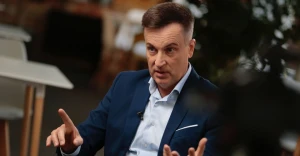
Neither US nor Europe were ready for tough sanctions against Putin in 2014 - former French President Hollande
Former French President Francois Hollande says that in 2014, Western countries were not ready to impose tough sanctions against Russia
He shared his opinions in an interview with the Frankfurter Allgemeine Zeitung.
In particular, he reiterated that the Minsk Agreements gave Ukraine time to strengthen its army, and this allowed it to break Russia’s plans in 2022.
"The international community as a whole, especially the US, and Europe, which was admittedly divided on the issue of relations with Vladimir Putin's Russia and the sanctions to be imposed, were not decisive enough. Together with Angela Merkel, our goal was to prevent war. The ceasefire reached in Minsk in 2015 limited the number of casualties. However, the West failed to realize that Putin was preparing for war," Hollande said.
According to Hollande, the Russian president has been counting on the weakness of the West all along. "He thought that political weakness and disagreements in the EU would encourage a soft response to the invasion of Ukraine. He believed that America's retreat from the world stage, which began with Obama, would end with Trump accelerating it, and the symptom of this was the disaster in Afghanistan, which Biden confirmed. This is how Putin mistakenly believed last year that he could go on the offensive," he explained.
"Putin was grossly mistaken about the Western reaction and, most importantly, the Ukrainian resistance. He did not realize that in 2022 the Ukrainian army was not the same as in 2014. The time allotted to Ukraine by the Minsk agreements allowed it to build up greater military readiness," Hollande said.
He also explained why neither France nor Germany could prevent the war:
"To prevent war, you need to establish a balance of power. We must clearly understand that in the event of an invasion, there will be a very strong backlash. Putin did not believe it. The Nord Stream 2 gas pipeline should have been stopped when it was still under construction, and Western companies should have left Russia much earlier. Then I canceled the export of Mistral helicopter carriers for the Russian Navy. France was alone in this far-reaching step, while the others continued their normal relations. At the same time, Putin invited former heads of government or appointed them to the boards of companies dependent on him," Hollande recalled.
In addition, he noted that the decision to refuse to sell Mistral ships to Russia was heavily criticized in France, but time has shown that it was the right one.
"Germany thought that by buying gas, it would dissuade Putin from military action. I could understand this reasoning. Usually a supplier behaves themselve, otherwise they lose a customer. But Putin would rather lose a market than a piece of territory. There was also a lot of leniency toward Putin in France. Some argued that Putin became aggressive because the West did not communicate with him enough, did not involve him enough in our decision-making processes, and ignored Russia's superiority too much. This accusation is false, it is meant to portray Putin as a victim and Russia as a country surrounded. Until recently, Emmanuel Macron also believed that he could establish a dialog with Putin. You have seen the result," Hollande stated.
"But the most important thing today is that we are united and withstand sensitive issues in order to continue to impose sanctions on the Russian economy, punish oligarchs and arm Ukrainians - and even agree to higher energy prices. It is not just about protecting Ukraine, but about democracy," he emphasized.
-
On March 20, most EU countries approved a plan to supply ammunition to Ukraine. However, there has been no official announcement yet.
-
Several countries are not on the preliminary list of project participants, but Hungary has recently officially announced that it has refused to participate in the purchase of 1 million rounds of ammunition for Ukraine.
-
Later, it became known that Poland and several other countries had not signed the EU plan to supply ammunition to Ukraine because they had not completed "internal procedures."
-
Eventually, on March 22, Spain joined the joint procurement agreement, and on March 23, Poland joined.
-
On March 25, the EU noted that the plans to confiscate Russian assets, primarily state assets worth about USD 350 billion, are unprecedented and complex.
- News














































